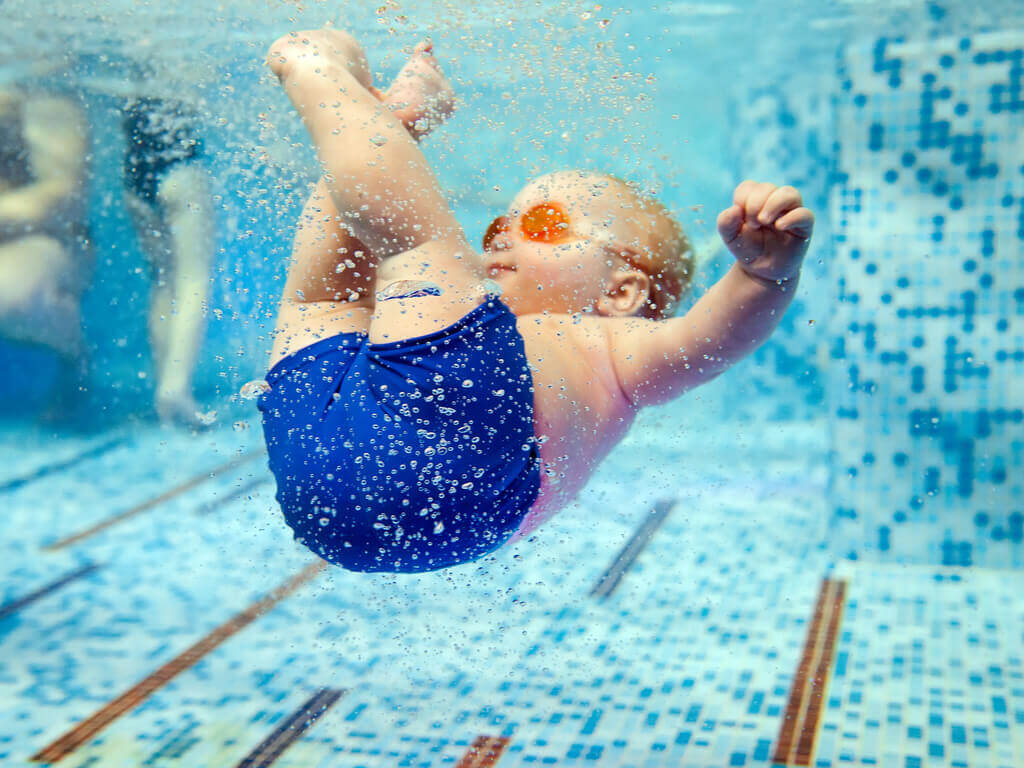5 Pool Safety Tips For Infants

As summer starts to settle in with over 90-degree weather, more families are heading to find relief by jumping into the water of their favorite pools. As parents, we know that infants and toddlers are always on the go. That quickly becomes dangerous when it comes to pool safety for infants around the pool. As parents, you need to know what to look for to prevent any harm to your little ones around the pool.
When you think about pool infant safety, what comes to mind? Do interchanging pool floats come to mind? Or making sure your infant doesn’t ingest pool water? There are many factors to pool safety for infants and toddlers, but we’re going to share our top five safety tips, providing you with the knowledge you need to keep your kiddos safe this summer!
#1. Body Temperature
Body temperature is something that many parents don’t look out for when swimming with their infant. They definitely should because an infant’s body temperature is not regulated like an adult’s temperature. For instance, babies have more skin area in relation to their weight. That’s why it makes them extremely sensitive to temperature in general.
In the pool, you always want to test the water temperature before getting in with your infant. Generally, the temperature of the water should be in the range of 85 to 87 degrees Fahrenheit. You never want to go in the pool at a freezing temperature or an extremely high temperature with your infant. This will cause a dramatic spike or drop in your infant’s temperature, resulting in hypothermia or a fever.
#2. Pool chemicals
Pool chemicals are another thing to look out for if you have a pool in your backyard. Pool chemicals can be toxic for your infant to inhale. We know most of those chemicals include chlorine, but did you know there are harsher materials sometimes used in those pool chemicals?
Certain chemicals, such as cyanuric acid, need to have their levels checked before you get in the pool with your baby. Anything above 90 ppm for acid is toxic. If your overall levels are too low, it can often form bacteria and algae in your pool instead. This is harmful for your baby too and can create health problems for them. If your overall level in the pool is too high, it can cause skin irritation for infants and adults.
Saltwater pools are safer for infants due to fewer chemicals, which means less skin irritation and health problems. You still want to make sure your infant or toddler doesn’t swallow or inhale the pool water, as ingesting too much pool water can cause pulmonary edema (fluid filling the lungs), recreation water illness, and/or chemical poisoning. Be careful when your infant is in the pool, always have them supervised!
#3. Flotation Devices
Floatation devices will help you have a fun relaxing time with your infant. They are keen when it comes to infants because it makes them feel weightless and they have more range of motion due to floating above the water. This makes it a lot more fun for babies to play and really enjoy the new sense of water!
Even though they are floating, always be beside them because things can change instantly. Always be sure to stay in the shallow end in case something happens and that way you can touch the bottom easily. Rule of thumb, there are never too many precautions with an infant or toddler.
#4. Sunscreen
Sunscreen is helpful for kids, but did you know you should avoid using sunscreen if your infant is less than 6 months old? Babies have a greater ratio of surface area of their skin relative to body weight, as mentioned above. This also means they can be more at risk of absorbing the chemicals in the sunscreen. As you know, infants always have their hands in their mouth and are constantly teething, which means they would more than likely ingest the sunscreen on their skin.
If you take your baby out in the pool, try to do so when it’s not the sunniest hours of the day, such as in the morning or early afternoon after 1 PM. Some alternatives to using sunscreen is having your infants wear hats while in the pool or even wearing UV-resistant bathing suits.
Typically, if your child is past 6 months old, you may be able to use sunscreen if the doctor advises you to do so.
#5. Swim Diapers
Swim diapers are another key tip when swimming with your infant. As you know, infants can’t control their bathroom habits just yet. You always want to make sure when swimming that they have a swim diaper — not a normal diaper. Traditional diapers tend to expand and disintegrate in the water which also leads to contamination.
If you do think that your pool may have been contaminated by your infant, you have to get everyone out of the pool immediately. After disposing of the fecal matter, increase the chlorine levels in your pool. This way the pool decontaminates itself. Also, make sure you check the levels of the pool during this process to ensure that the pool is safe for everyone.
If you need help managing your pool system, Aqua Leisure can help!
Aqua Leisure Pools and Spas will point you in the right direction and give you the insight you need for your pool system. That way you can enjoy this hot summer with your family and friends poolside safely. Stop by our Aqua Leisure locations in Tannersville, Wilkes-Barre, and Dickson City today for all your pool needs!
Posted by Aqua Leisure Pools & Spas in Pools

